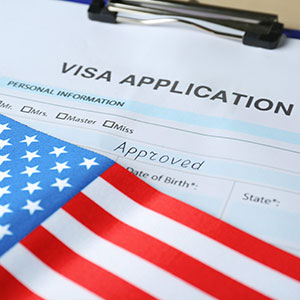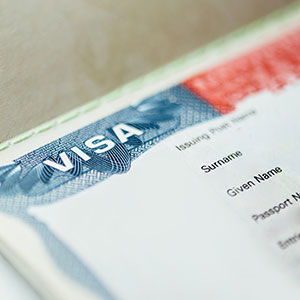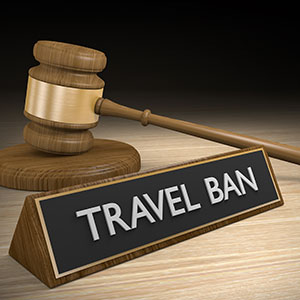
The P category of visas is for foreign nationals who intend to come to the United States to perform either in athletics or entertainment. It is the visa of choice for those who may not have the “extraordinary ability” necessary to qualify for an O visa. If you are an entertainer or group of entertainers seeking to perform in the United States, you should be aware of the different types of P visas available and the requirements for each category. P-1 Visa P-1 visas are available for entertainers who will be performing in a group. An individual will generally not be eligible for a P-1 visa. A P-1 visa will be granted to an entertainment group based on its own international reputation. They must be “internationally recognized” which is defined as “having a high level of achievement in a field evidenced by a degree of skill and recognition substantially above that ordinarily encountered, to the extent that such achievement is renowned, leading, or well-known in…Read More

In order for a foreign national to work in the United States, they need to obtain a work visa. One of the most widely used and useful work visas is the L visa, which allows a temporary worker to come to the United States for an extended period of time. What Is An L Visa? This type of visa allows a foreign company to transfer certain employees to work for an affiliated U.S. company. It is a nonimmigrant visa that is temporary in nature. An L-1A visa is used to transfer a company’s executives and/or managers. An L-1B visa is used for individuals with specialized knowledge. An L-2 visa is used for family members of an L-1 visa holder. Benefits Of The Visa One benefit of anL visa is that the worker can stay in the United States for an extended period of time. The holder of the visa is allowed to work for the company in the United States for a set amount of…Read More

Teams in the United States have been recruiting foreign athletes from around the world to compete in sports like soccer, baseball, and football. In addition, state of the art training facilities make the United States an attractive location for high caliber athletes to train for international competitions like the Olympics. In some cases, these athletes may want to become permanent United States residents. This is where EB-1 green cards can be helpful. Extraordinary Ability An EB-1 visa and green card is available for foreign nationals who demonstrate extraordinary ability in the sciences, arts, education, business, and athletics. To obtain an EB-1 visa, an athlete must be able to demonstrate extraordinary ability in their sport, plan to work in the sport in the United States, and demonstrate that their work in that sport will be beneficial to the United States. The athlete must show that they have “sustained or international acclaim” and that their achievements have been recognized in their field. The athlete must show either…Read More

While there are many ways to live and work in the United States, the E-2 treaty investor visa represents a way that you can build your own business. The application for an E-2 visa is not overly complicated. However, there are a number of requirements to keep in mind. Requirements For An E-2 Treaty Investor In order to qualify for an E-2 visa, a treaty investor must: Be a national of a country with which the United States maintains a treaty of commerce and navigation. These treaty countries can be found here. Have invested or be actively in the process of investing, a substantial amount of capital in a bona fide enterprise in the United States. Be seeking to enter the United States solely to develop and direct the investment enterprise. This is established by showing at least 50% ownership of the enterprise or possession of operational control through a managerial position or other corporate device. What Is An “Investment?” An investment is the treaty investor’s…Read More

An O-1 visa is a useful tool for those foreign nationals with extraordinary ability who wish to work in the United States. However, there are some common misconceptions. I Can Work For Multiple Employers On An O-1 Visa With very few exceptions, nearly every work visa in the United States must be tied to a specific employer. An O-1 sponsor does not have to be an employer in the strictest sense. An individual can work for an agent and then perform work for multiple clients through that agent. However, if an individual wishes to work for multiple employers or multiple agents, they would have to be sponsored under multiple concurrent petitions. In addition, if an O visa holder wishes to change employers, they would have to file a new petition sponsored by the new employer. An O-1 Visa Is Only For Artists While sometimes referred to as an “artist” visa, O-1 visas are available to individuals who possess extraordinary ability in any field. O-1A visas are available…Read More

As the United States responds to coronavirus, many immigrants are feeling frightened and confused about how this will impact them. While things are changing quickly and it’s difficult to be certain of what we can expect, our team is here for you and wants to help. In today’s blog, we’re looking at a few of the ways COVID-19 has affected the immigration process and what these changes mean for you. 1. Limited Travel Across The United States And Mexico Border As of March 20th and until at least April 20th, non-essential travel between the United States and Mexico has been forbidden. Essential travel includes U.S. citizens and lawful permanent residents re-entering the United States, travel for medical purposes, travel for education, travel for work, travel for emergency response, cross-border trade, governmental and diplomatic travel, and military travel. All other travel is on hold. These changes mean that visits to see family or take a vacation will not be allowed in this interim. There are also…Read More

O visas are a useful tool for individuals of extraordinary ability who wish to work in the United States. Here are some frequently asked questions: What Is The Purpose Of An O Visa? The O visa is a nonimmigrant visa available to those individuals, and their families and support personnel, who demonstrate extraordinary ability in the sciences, arts, education, business, or athletics, or who have a demonstrated record of extraordinary achievement in the motion picture or television industry. What Are The Benefits Of An O-1 Visa? Unlike with an H1-B visa, there is no lottery that an employee has to go through for an O-1 visa. O visas can be issued fairly quickly and are granted for a maximum of three years with unlimited one-year extensions. O-1 visa holders may also pursue permanent residency. What Does “Extraordinary Ability” Mean? The phrase “extraordinary ability” means that a person has a level of expertise and is one of that small percentage of individuals who have risen to…Read More

The American Medical Association (AMA) is urging the Trump administration to open up the visa process to allow more foreign physicians to enter the country. This request comes in light of the COVID-19 pandemic when there is a greater need for doctors across the country. The AMA wants foreign doctors to quickly become part of the workforce. In a March letter to Secretary of State Mike Pompeo and Acting Secretary of Homeland Security Chad Wolf, the AMA urged an opening in the visa process at embassies and consulates worldwide for physicians seeking to enter U.S. residency programs in July. The AMA also urged public confirmation that J-1 physicians could be redeployed to new rotations. The Importance Of An Open Process There was already a physician shortage in the United States, even before the pandemic. The long and lengthy H-1B visa process has made it difficult for health systems to get qualified medical professionals in a timely manner. The process began to take even longer under the Trump…Read More

It appears that the Trump administration plans to increase immigration fees for many business applications by 50%. It also will increase the fees paid by workers to become citizens or gain permanent residency. This increase in fees could hit businesses hard. Proposed Rule On Immigration Fees In November of 2019, the Department of Homeland Security (DHS) published a proposed rule. This rule called for an increase in fees for key business immigration categories. It amounts to, essentially, an increased tax on businesses that use foreign workers. Undermining the argument that an immigrant workforce takes jobs away from Americans is the fact that job openings in the U.S. outnumber the unemployed. The increase in fees will likely not decrease the slow processing times that many have experienced lately. The rules specifically state that factors that are affecting processing times will not be changed. The average USCIS processing time has increased by 91% between 2014 and 2018. This is even in light of the fact that the number…Read More

In January of 2020, Trump added new countries to his U.S. visa travel ban. This move will virtually block immigration from Africa’s most populous country, Nigeria. It will also block immigration from Myanmar, where Muslims are fleeing genocide. Additional countries include three more African countries: Eritrea, Sudan, and Tanzania. In addition, the former soviet state Kyrgyzstan has been added to the ban. Visa Travel Ban All of the banned countries have substantial Muslim populations. Immigrant visas will be banned for those in Nigeria, Myanmar, Eritrea, and Kyrgyzstan. Immigrants from Sudan and Tanzania will not be allowed to participate in the diversity lottery, which issues green cards to 50,000 people each year. The latest travel ban took effect on February 22, 2020. Immigrants obtaining visas before then will still be able to come to the United States. Nonimmigrant visas, including those for temporary employees and employees with specialized skills, will not be affected by the ban. In addition, some immigrants will be able to apply for…Read More